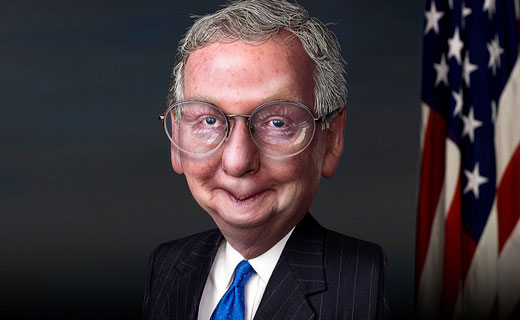
Statements by Republican Senate Minority Leader Mitch McConnell this weekend reflect a GOP leadership determined to kill any further talk of taxing the rich. “The tax issue is finished. Over. Completed. That’s behind us,” McConnell said on ABC News over the weekend and in the New York Times today.
The Republicans are going even further, however, threatening that unless Social Security and Medicare are cut, the GOP might kill the entire economy.
They could accomplish this, observers note, by refusing to allow the country to raise the debt ceiling to pay for bills already incurred, by demanding crippling spending cuts or by shutting down the government by killing a continuing budget resolution.
The McConnell insistence that all attention must now turn to spending cuts ignores what has happened thus far, progressives say. They point out that, until last week’s tax deal, all of the efforts to deal with the economic disaster have been cuts in services, not tax increases.
All the efforts, with last week’s deal included, have reduced the deficit thus far by $1.5 trillion. The tax measure passed last week reduces the deficit by $620 billion, less than half the reduction achieved by the totality of measures taken thus far, which have been dominated by spending cuts.
Unions and their allies say trillions of dollars in spending on rebuilding infrastructure, overhauling the education system, massive creation of green energy jobs and other measures are what is really needed to cure deficits, long term.
Congressional Democrats appear to be aiming for a “deficit reduction” package this year that would achieve another cut of $2 trillion from the deficit, with half coming from higher taxes and half coming from spending cuts.
According to an article in The Hill today, “The emerging consensus is that the next installment of deficit reduction should reach $2 trillion and about a half of it should come from higher taxes.”
“I thought $4 trillion is a goal we should reach. I think we’re about half way there. We need another $2 trillion,” Sen. Ben Cardin (D-Md.) was quoted as saying. Cardin said that $917 billion in cuts under the Budget Control Act of 2011, combined with $620 billion in revenues from last week’s tax agreement, plus interest savings, adds up to $2 trillion.
While McConnell, then, envisions all spending cuts and no further tax increases on the rich, Cardin is pushing for a $2 trillion deal with a ratio of spending cuts to higher taxes that is about one to one.
There are some conservative Democrats, however, who want a higher ratio of spending cuts to taxes. Sen. Tim Kaine, one of the newly-elected Democrats in the Senate, appears to be in this category and has said publicly the ratio should be higher.
Former Massachusetts Rep. Barney Frank, a Democrat, is calling for a higher payroll tax on high incomes. Frank, who retired from the House, has announced that he is seeking appointment to the U.S. Senate seat in Massachusetts that will be vacated by Sen. John Kerry when he takes over as President Obama’s Secretary of State. The appointment by the state’s governor, Democrat Duvall Patrick, would last until a special election is held in the Spring or Summer.
“We did not get at taxes between $250,000 and $450,000, which makes it good territory for putting it out for the Social Security tax base,” said Frank. “There is a segment of income from people who make between $250,000 and $450,000 who we think could sustain an increase in taxes.”
Photo: Mitch McConnell is among the Republicans who want to cease all talks of taxing the rich. DonkeyHotey/Flickr










